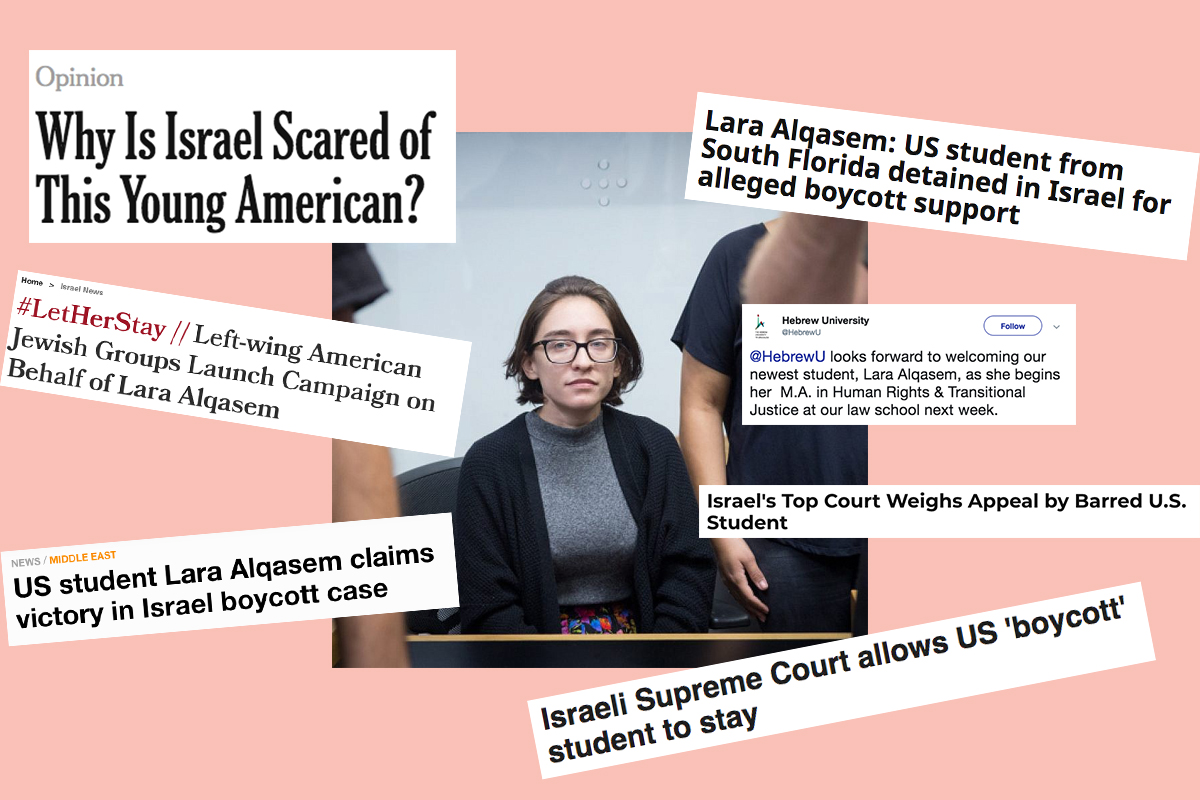Lara Alqasem is a 22-year-old American who travelled to Israel with the intention of getting her master’s at the Hebrew University of Jerusalem. When she arrived in Israel’s Ben Gurion Airport, she was detained. Over two weeks later, the Israeli Supreme Court ruled that she can stay.
We’re here to break down what happened.
Who is Lara Alqasem?
Alqasem is a graduate of the University of Florida. She’s from a suburb of Fort Lauderdale, has Palestinian grandparents, and decided to get a master’s in Human Rights & Transitional Justice at Hebrew University’s law school. She received a student visa from the Israeli Consul in Miami, Florida.
Why did she get detained?
When she arrived at Ben Gurion airport on October 2, Israeli officials detained her, due to her alleged involvement in the Boycott, Divest, Sanction movement (BDS). At University of Florida, Alqasem was president of the group “Students for Justice in Palestine” (SJP), a group that campaigns in favor of BDS. As JTA reported, “a 2017 law allows Israel to prohibit entry to BDS supporters.”
Israeli Strategic Affairs Minister Gilad Erdan — in charge of Israel’s anti-boycott activities — explained the logic, arguing, “The court clearly declared that a state has the right to protect itself not only in matters of security, but also to fight boycotts against its products, culture or standing.” Similarly, the consul general of the Israeli Consul in Miami, Lior Haiat, said, “She’s a brilliant student, maybe, but she’s also a BDS activist.” Because of this, Haiat argued, Alqasem shouldn’t study on Israeli taxpayers’ money, adding, “We don’t want BDS activists in Israel because they call to destroy Israel.”
Alqasem decided to stay and fight her deportation, living in detainment at the Ben Gurion airport. While detained, she was denied a phone, computer, pen, and paper. In her testimony to an appeals court, she said, “I don’t support BDS. If I supported it, I wouldn’t be able to come to Israel as a student.” On October 12, an Israeli court rejected her appeal to enter Israel.
What happened next?
Alqasem’s Israeli lawyer, Yotam Ben-Hillel, told Haaretz, “The law forbidding the entry of those who criticize Israel’s actions is shameful and should stop. The case of Lara Alqasem dealt with the shameful manner in which the law is implemented.”
After news of her detainment spread, outrage followed suit. There was a GoFundMe started for her (as of this writing, it’s raised $15,014 of its $18,000 goal) to help cover legal funds. Major American Jewish groups, including the Anti-Defamation League, the Reform Movement, and J Street, backed her. Even conservative New York Times columnists Bret Stephens and Bari Weiss argued in a joint op-ed, “Why Is Israel Scared of This Young American?” that, “detaining people like Ms. Alqasem also does little to stem a worrying trend among young American Jews, who are increasingly alienated from Israel because of its hard-line policies.”
While some expressed support of the decision to keep her out, mostly everyone agreed this was a bad move on Israel’s part.
Hebrew University joined Alqasem’s appeal to the district court, stating, “The Hebrew University supports a position of tolerance toward those who call for a boycott – we don’t prevent anyone from participating in university activities, in studying, teaching and research, even if he calls for a boycott against us. We think it is better to maintain an open discourse and to respond to claims that we should be boycotted in a pointed manner rather than through force.” Hebrew University president Asher Cohen said, “What’s being done regarding [Alqasem] hurts our activities against BDS. She wants to come here and learn.”
What happens now?
The Israeli Supreme Court ruled on October 18 that Alqasem can stay in the country. Their logic? By going to Israel to study at Hebrew U, Alqasem clearly is not participating in a boycott. Israeli Supreme Court Judge Neal Hendel wrote,“On the eve of the academic year, the plaintiff landed in Israel, and despite the obstacles placed in her way since, she has insisted on her right to sit on the benches of Hebrew University. This conduct does not accord, to put it lightly, with the charge that the plaintiff is a covert boycott activist who is likely to take advantage of her stay in Israel to advance the BDS movement.”
Ben-Hillel, Alqasem’s lawyer, released a statement celebrating the ruling as a victory for free speech, saying, “Israel has the right to control its borders, but that right does not give the Ministry of Interior unchecked power to turn away anyone it deems unwanted. By taking a principled and brave stand against a wildly escalating power play by the Ministry of Interior, Lara has ensured that no one else should be denied the right to enter Israel based on sloppy Google searches and dossiers by shadowy smear groups.”



